人教版(2019)选择性必修第二册Unit3 Food and Culture Learning about language课件(共29张PPT)
文档属性
| 名称 | 人教版(2019)选择性必修第二册Unit3 Food and Culture Learning about language课件(共29张PPT) |
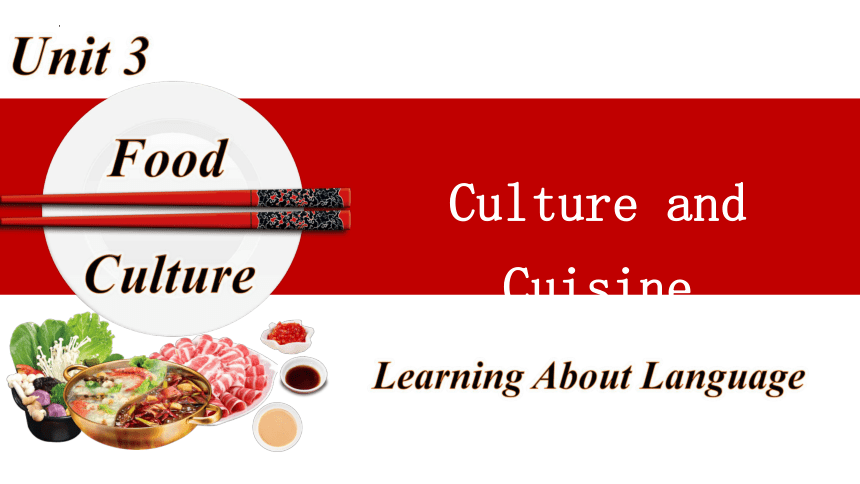
|
|
| 格式 | pptx | ||
| 文件大小 | 3.5MB | ||
| 资源类型 | 教案 | ||
| 版本资源 | 人教版(2019) | ||
| 科目 | 英语 | ||
| 更新时间 | 2023-11-29 00:00:00 | ||
图片预览

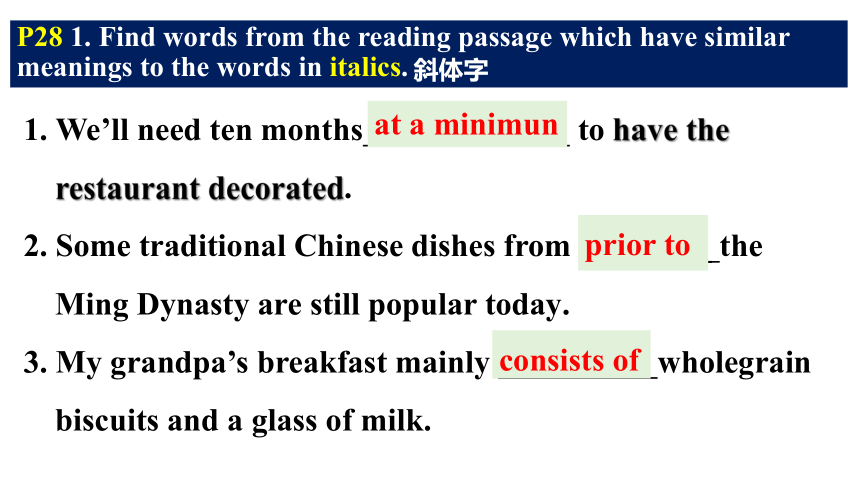

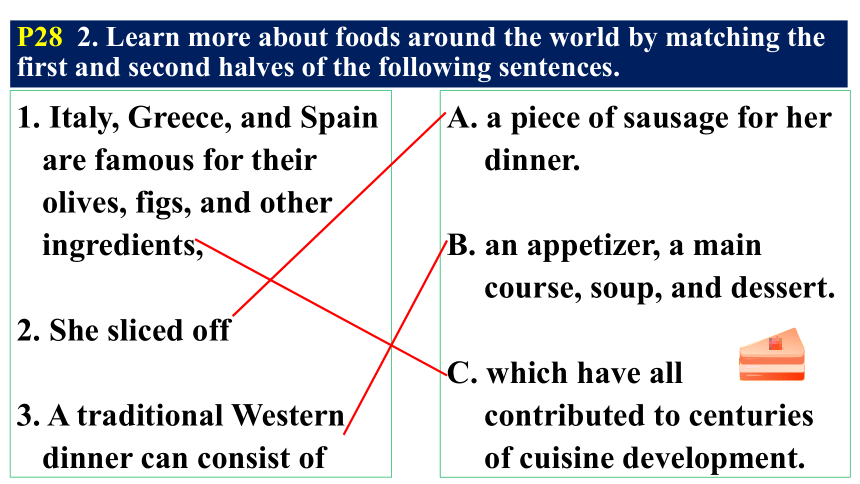
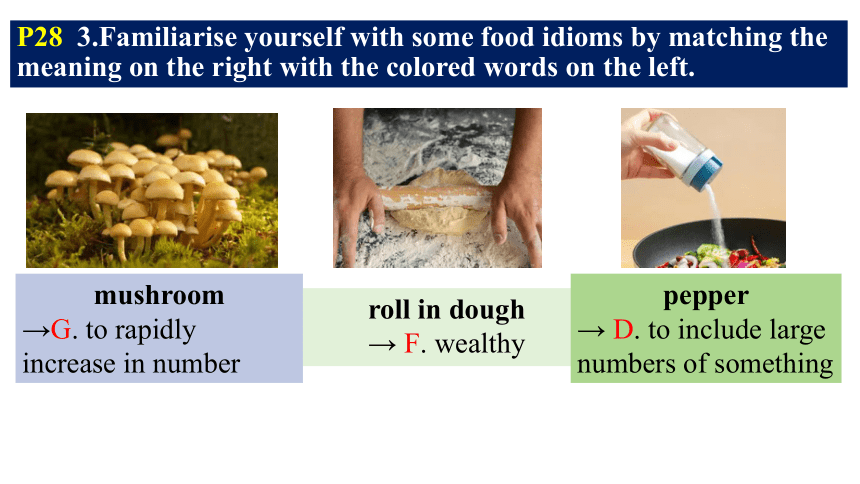
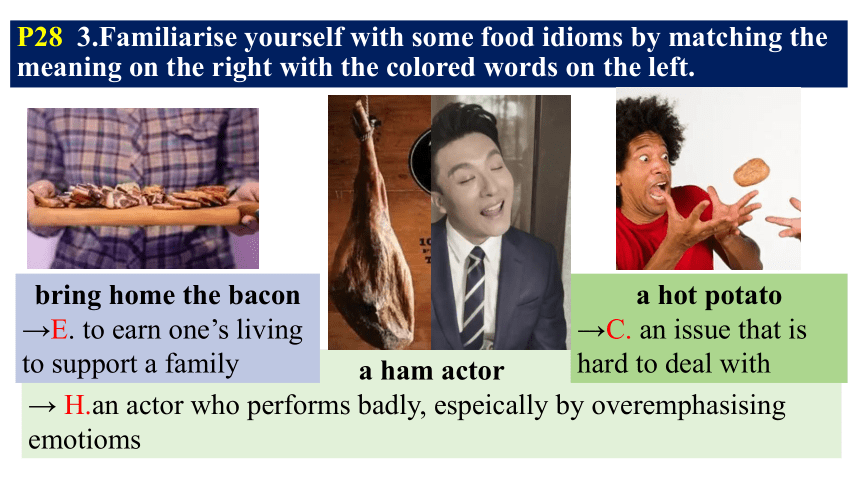
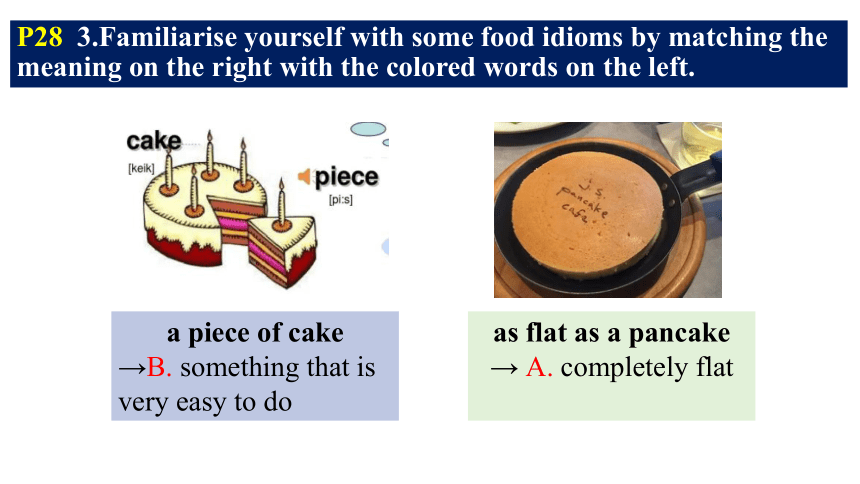
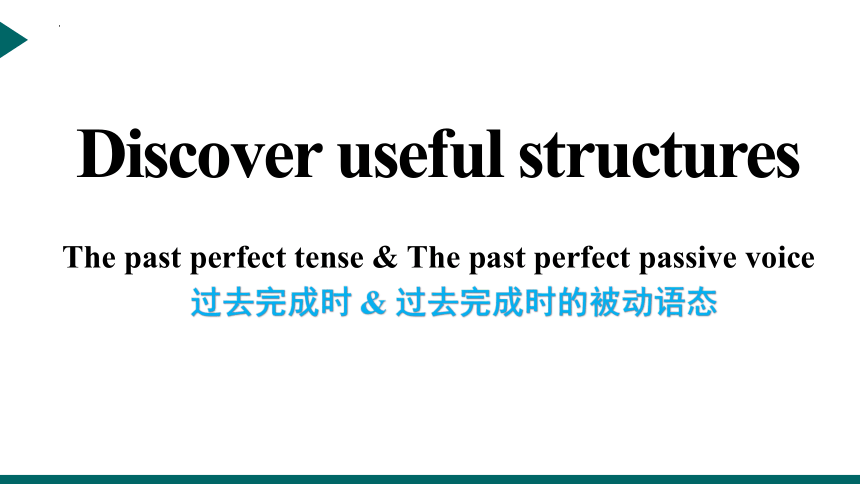

文档简介
(共29张PPT)
Food
Culture
Unit 3
Culture and Cuisine
Learning About Language
Culture and Cuisine
P28 1. Find words from the reading passage which have similar meanings to the words in italics.
1. We’ll need ten months at least to have the restaurant decorated.
2. Some traditional Chinese dishes from before__ the Ming Dynasty are still popular today.
3. My grandpa’s breakfast mainly includes wholegrain biscuits and a glass of milk.
consists of
斜体字
at a minimun
prior to
P28 1. Find words from the reading passage which have similar meanings to the words in italics.
4. People in this area would eat nearly a kilo of cheese per week.
5. We enjoyed a special dinner in a fancy restaurant where the waiters all wore attractive suits.
6. He prefers this brand of coffee which, as he said, has an unusually good flavour.
consume
elegant
exceptional
P28 2. Learn more about foods around the world by matching the first and second halves of the following sentences.
1. Italy, Greece, and Spain are famous for their olives, figs, and other ingredients,
2. She sliced off
3. A traditional Western dinner can consist of
A. a piece of sausage for her dinner.
B. an appetizer, a main course, soup, and dessert.
C. which have all contributed to centuries of cuisine development.
P28 3.Familiarise yourself with some food idioms by matching the meaning on the right with the colored words on the left.
mushroom
→G. to rapidly increase in number
roll in dough
→ F. wealthy
pepper
→ D. to include large numbers of something
P28 3.Familiarise yourself with some food idioms by matching the meaning on the right with the colored words on the left.
a ham actor
→ H.an actor who performs badly, espeically by overemphasising emotioms
a hot potato
→C. an issue that is hard to deal with
bring home the bacon
→E. to earn one’s living to support a family
P28 3.Familiarise yourself with some food idioms by matching the meaning on the right with the colored words on the left.
a piece of cake
→B. something that is very easy to do
as flat as a pancake
→ A. completely flat
Discover useful structures
The past perfect tense & The past perfect passive voice
过去完成时 & 过去完成时的被动语态
1. Observe
观察
01
Observe and discuss the followling sentences.
B. By the time the policeman got to the shop, the thief had run away.
A.Hong Kong had returned to China before Macao came back to China.
present
past
future
earlier past
had returned
came back
had run
got to
Past perfect:
had done
The past perfect tense is used to tell an activity done before something in the past. So it is used in a background of past.
P29 2. Complete the two conversations with the correct forms of the words in the box using the past perfect tense or the past perfect passive voice.
cancel, eat, finish, get, taste, tell
1. Carol: _____ you ever ______ any Scottish food before
your trip to St. Andrews last year
Paul: No, not really. But I ________________ about
haggis many times before we went there.
Carol: Oh…Did you try it
Paul: Oh, yes! You know what We arrived late for
supper that day, and so we just ate whatever was
left in the university canteen.We ________________
our meal before we learnt we _____ just ______
haggis!
Carol: My goodness!
Paul: Well, it was not bad. I have to say…
cancel, eat, finish, get, taste, tell
Had
tasted
had been told
had finished
had
eaten
2. Carol: When I got to the teahouse yesterday, I found
nobody there. _____ it ________________
Paul: Oh, I’m so sorry that I forgot to tell you! The get-
together was canceled yesterday morning
because Sally, the hostess, ___________ into a car
accident.
Carol: Oh, I’m sorry to hear that. Hope Sally recovers
soon!
Had
been canceled
had got
arrive, cancel, eat, finish, get, taste, tell
2. 过去完成时的结构和语态
Form and voice
时态:过去完成时
语态:主动
结构:had done
动作:先发生
连接词
Reread the sentences again,paying attention to the use of the past perfect tense and the past perfect passive voice.
1. The chef had set up a farm-to-table restaurant before his new cookbook was published.
连接词
时态: 一般过去时
语态: 被动
动作: 后发生
时态: 过去完成时
语态: 主动
结构: had done
动作: 先发生
Their dinner had been finished by the time Sam joined them.
连接词
时态: 一般过去时
语态: 主动
动作: 后发生
时态: 过去完成时
语态: 被动
结构: had been done
动作: 先发生
2 They had finished their dinner by the time Sam joined them.
Their dinner had been finished by the time Sam joined them.
连接词
时态: 一般过去时
语态: 主动
动作: 后发生
时态: 过去完成时
语态: 主动
结构: had done
动作: 先发生
连接词
时态: 一般过去时
语态: 主动
动作: 后发生
时态: 过去完成时
语态: 被动
结构: had been done
动作: 先发生
过去完成时的基本结构和语态
主动语态 被动语态
肯定形式 had done had been done
否定形式 had not done had not been done
一般疑问句 had+主语+done had+主语+been done
特殊疑问句 疑问词+had+主语+done 疑问词+had+主语+been done
02
1 句型转换
①They had cleaned the classroom before the teacher came.
→__________________________________________________ (改为被动语态)
②She had finished writing the composition by 10:00 this morning.
→_____________________________________________________________
(改为否定句)
→_________________________________________________________ (改为一般疑问句)
→____________________________________________________________
(对句中主语she提问)
The classroom had been cleaned before the teacher came.
She had not finished writing the composition by 10:00 this morning.
Had she finished writing the composition by 10:00 this morning
Who had finished writing the composition by 10:00 this morning?
过去完成时的用法
(1) 在过去某一时间/动作之前已完成, 即“过去的过去”。
时间 可以用by, before等介词短语或一个时间状语从句表示。
before(连词/介词) + 过去时间点 : 在...之前
by +过去时间点 : 到...为止
by the end of +过去时间点 : 到...为止
by the time +(一般过去时): 到...为止
时间状语:
I ________________(finish) reading the novel by nine O'clock last night.
We ________________(learn) over two thousand English words by the end of last term.
They ______________(plant) six hundred trees before last Wednesday.
They ___________(leave) before we arrived at the school.
Breakfast ___________________(serve) by the time I got up.
Examples and Exercises
had finished
had learned
had planted
had left
had been served
(2) 由过去的某一时刻开始,一直延续到过去另一时间,
常与for,since引导的时间状语连用。
I __________ at the bus stop for 20 minutes when a bus finally came.
He said he ____________ (work) in that factory since 1949.
had been
had worked
now
A
B
(3) 某些动词可用过去完成时,表过去未曾实现的想法、希望、打算或意图等。
hope
wish
expect
think
intend
mean
suppose
We had hoped that you would come,but you didn't. 我们本希望你来,但你没有来。
I had thought that you would become a doctor.
我本以为你会成为医生。
我们本希望你来,但你没有来。
本以为你会成为医生。
It/This/That was the (first/second..) time+(that)+句子
句子用“过去完成时”
E.g.
It was the second time that I _________(lose) the chance.
This was the first time that he ___________(be)the winner.
1. 那是 ... 第几次做某事了。
(4)过去完成时的常用句型
比较:
That is the first time that she ___________(visit) Beijing.
had lost
had been
has visited
It/This/That was +形容词最高级+n+ that (+句子)
句子用“过去完成时”
E.g.
It was the most wonderful song that I ____________ ever (hear).
That was the most important finding that ____________(prove).
This was one of the useful bookes that I ______________(read).
2. 这是最....的
had heard
had been proved
had read
比较:
You are the sweetest person I have ever met.
hardly(scarcely/barely)..(had done)..when..(从句用did)
no sooner..(had done)..than...(从句用did)
注:
若hardly/scarcely/barely/no sooner(否定词) 位于句首,则主句部分, 用部分倒装,即: had+主语+done…
3. 一...就
e7d195523061f1c0f0ec610a92cff745ee13794c7b8d98f8E73673273C9E8BE17CC3D63B9B1D6426C348A354AD505654C28F453CD7C8F90EADD06C08281DAED7140E5AAAED5880ECE414DFB6A93B82BE019406867034C3A8500A4827DCF3FBF74A471B736410707E336A01C9ADC9BE02ACCB8DF2121D81636A067B8AE80C6AB6F014154F4E7B7247
总结
听了这个滑稽的故事,大家都哈哈大笑。
We had hardly/scarely heard the funny story when we burst into laughter.
We had no sooner heard the funny story than we burst into laughter.
当hardly,scarely,no sooner位于句首时,主句应用部分倒装
升级为部分倒装
Hardly/Scarely had sb done sth when sb did
No sooner had sb done sth than +sb did
4 用于虚拟语气中
1. I wish I had told him about it.
2. He talked about Rome as if he had been there.
3. If only we had entered college last year!
4. If it hadn’t been for your help yesterday, I could not have caught the bus.
5. If you had taken my advice then, you would not be in trouble now.
对过去的虚拟
2 单句语法填空
①I _____________ (intend) to call on you but I was too busy then.
②We hurried to the station only to find that the train _________ (leave).
③A week passed when she realised that the parcel ______________ (send) to the wrong address.
④No sooner ____ (have) the boy spoken these words than the warden hit him on the head with the soup spoon.
⑤It was the best film that __________________ (direct) by him.
⑥It was the first time that they ____________ (enjoy) such a wonderful performance.
had intended
had left
had been sent
had
had been directed
had enjoyed
Food
Culture
Unit 3
Culture and Cuisine
Learning About Language
Culture and Cuisine
P28 1. Find words from the reading passage which have similar meanings to the words in italics.
1. We’ll need ten months at least to have the restaurant decorated.
2. Some traditional Chinese dishes from before__ the Ming Dynasty are still popular today.
3. My grandpa’s breakfast mainly includes wholegrain biscuits and a glass of milk.
consists of
斜体字
at a minimun
prior to
P28 1. Find words from the reading passage which have similar meanings to the words in italics.
4. People in this area would eat nearly a kilo of cheese per week.
5. We enjoyed a special dinner in a fancy restaurant where the waiters all wore attractive suits.
6. He prefers this brand of coffee which, as he said, has an unusually good flavour.
consume
elegant
exceptional
P28 2. Learn more about foods around the world by matching the first and second halves of the following sentences.
1. Italy, Greece, and Spain are famous for their olives, figs, and other ingredients,
2. She sliced off
3. A traditional Western dinner can consist of
A. a piece of sausage for her dinner.
B. an appetizer, a main course, soup, and dessert.
C. which have all contributed to centuries of cuisine development.
P28 3.Familiarise yourself with some food idioms by matching the meaning on the right with the colored words on the left.
mushroom
→G. to rapidly increase in number
roll in dough
→ F. wealthy
pepper
→ D. to include large numbers of something
P28 3.Familiarise yourself with some food idioms by matching the meaning on the right with the colored words on the left.
a ham actor
→ H.an actor who performs badly, espeically by overemphasising emotioms
a hot potato
→C. an issue that is hard to deal with
bring home the bacon
→E. to earn one’s living to support a family
P28 3.Familiarise yourself with some food idioms by matching the meaning on the right with the colored words on the left.
a piece of cake
→B. something that is very easy to do
as flat as a pancake
→ A. completely flat
Discover useful structures
The past perfect tense & The past perfect passive voice
过去完成时 & 过去完成时的被动语态
1. Observe
观察
01
Observe and discuss the followling sentences.
B. By the time the policeman got to the shop, the thief had run away.
A.Hong Kong had returned to China before Macao came back to China.
present
past
future
earlier past
had returned
came back
had run
got to
Past perfect:
had done
The past perfect tense is used to tell an activity done before something in the past. So it is used in a background of past.
P29 2. Complete the two conversations with the correct forms of the words in the box using the past perfect tense or the past perfect passive voice.
cancel, eat, finish, get, taste, tell
1. Carol: _____ you ever ______ any Scottish food before
your trip to St. Andrews last year
Paul: No, not really. But I ________________ about
haggis many times before we went there.
Carol: Oh…Did you try it
Paul: Oh, yes! You know what We arrived late for
supper that day, and so we just ate whatever was
left in the university canteen.We ________________
our meal before we learnt we _____ just ______
haggis!
Carol: My goodness!
Paul: Well, it was not bad. I have to say…
cancel, eat, finish, get, taste, tell
Had
tasted
had been told
had finished
had
eaten
2. Carol: When I got to the teahouse yesterday, I found
nobody there. _____ it ________________
Paul: Oh, I’m so sorry that I forgot to tell you! The get-
together was canceled yesterday morning
because Sally, the hostess, ___________ into a car
accident.
Carol: Oh, I’m sorry to hear that. Hope Sally recovers
soon!
Had
been canceled
had got
arrive, cancel, eat, finish, get, taste, tell
2. 过去完成时的结构和语态
Form and voice
时态:过去完成时
语态:主动
结构:had done
动作:先发生
连接词
Reread the sentences again,paying attention to the use of the past perfect tense and the past perfect passive voice.
1. The chef had set up a farm-to-table restaurant before his new cookbook was published.
连接词
时态: 一般过去时
语态: 被动
动作: 后发生
时态: 过去完成时
语态: 主动
结构: had done
动作: 先发生
Their dinner had been finished by the time Sam joined them.
连接词
时态: 一般过去时
语态: 主动
动作: 后发生
时态: 过去完成时
语态: 被动
结构: had been done
动作: 先发生
2 They had finished their dinner by the time Sam joined them.
Their dinner had been finished by the time Sam joined them.
连接词
时态: 一般过去时
语态: 主动
动作: 后发生
时态: 过去完成时
语态: 主动
结构: had done
动作: 先发生
连接词
时态: 一般过去时
语态: 主动
动作: 后发生
时态: 过去完成时
语态: 被动
结构: had been done
动作: 先发生
过去完成时的基本结构和语态
主动语态 被动语态
肯定形式 had done had been done
否定形式 had not done had not been done
一般疑问句 had+主语+done had+主语+been done
特殊疑问句 疑问词+had+主语+done 疑问词+had+主语+been done
02
1 句型转换
①They had cleaned the classroom before the teacher came.
→__________________________________________________ (改为被动语态)
②She had finished writing the composition by 10:00 this morning.
→_____________________________________________________________
(改为否定句)
→_________________________________________________________ (改为一般疑问句)
→____________________________________________________________
(对句中主语she提问)
The classroom had been cleaned before the teacher came.
She had not finished writing the composition by 10:00 this morning.
Had she finished writing the composition by 10:00 this morning
Who had finished writing the composition by 10:00 this morning?
过去完成时的用法
(1) 在过去某一时间/动作之前已完成, 即“过去的过去”。
时间 可以用by, before等介词短语或一个时间状语从句表示。
before(连词/介词) + 过去时间点 : 在...之前
by +过去时间点 : 到...为止
by the end of +过去时间点 : 到...为止
by the time +(一般过去时): 到...为止
时间状语:
I ________________(finish) reading the novel by nine O'clock last night.
We ________________(learn) over two thousand English words by the end of last term.
They ______________(plant) six hundred trees before last Wednesday.
They ___________(leave) before we arrived at the school.
Breakfast ___________________(serve) by the time I got up.
Examples and Exercises
had finished
had learned
had planted
had left
had been served
(2) 由过去的某一时刻开始,一直延续到过去另一时间,
常与for,since引导的时间状语连用。
I __________ at the bus stop for 20 minutes when a bus finally came.
He said he ____________ (work) in that factory since 1949.
had been
had worked
now
A
B
(3) 某些动词可用过去完成时,表过去未曾实现的想法、希望、打算或意图等。
hope
wish
expect
think
intend
mean
suppose
We had hoped that you would come,but you didn't. 我们本希望你来,但你没有来。
I had thought that you would become a doctor.
我本以为你会成为医生。
我们本希望你来,但你没有来。
本以为你会成为医生。
It/This/That was the (first/second..) time+(that)+句子
句子用“过去完成时”
E.g.
It was the second time that I _________(lose) the chance.
This was the first time that he ___________(be)the winner.
1. 那是 ... 第几次做某事了。
(4)过去完成时的常用句型
比较:
That is the first time that she ___________(visit) Beijing.
had lost
had been
has visited
It/This/That was +形容词最高级+n+ that (+句子)
句子用“过去完成时”
E.g.
It was the most wonderful song that I ____________ ever (hear).
That was the most important finding that ____________(prove).
This was one of the useful bookes that I ______________(read).
2. 这是最....的
had heard
had been proved
had read
比较:
You are the sweetest person I have ever met.
hardly(scarcely/barely)..(had done)..when..(从句用did)
no sooner..(had done)..than...(从句用did)
注:
若hardly/scarcely/barely/no sooner(否定词) 位于句首,则主句部分, 用部分倒装,即: had+主语+done…
3. 一...就
e7d195523061f1c0f0ec610a92cff745ee13794c7b8d98f8E73673273C9E8BE17CC3D63B9B1D6426C348A354AD505654C28F453CD7C8F90EADD06C08281DAED7140E5AAAED5880ECE414DFB6A93B82BE019406867034C3A8500A4827DCF3FBF74A471B736410707E336A01C9ADC9BE02ACCB8DF2121D81636A067B8AE80C6AB6F014154F4E7B7247
总结
听了这个滑稽的故事,大家都哈哈大笑。
We had hardly/scarely heard the funny story when we burst into laughter.
We had no sooner heard the funny story than we burst into laughter.
当hardly,scarely,no sooner位于句首时,主句应用部分倒装
升级为部分倒装
Hardly/Scarely had sb done sth when sb did
No sooner had sb done sth than +sb did
4 用于虚拟语气中
1. I wish I had told him about it.
2. He talked about Rome as if he had been there.
3. If only we had entered college last year!
4. If it hadn’t been for your help yesterday, I could not have caught the bus.
5. If you had taken my advice then, you would not be in trouble now.
对过去的虚拟
2 单句语法填空
①I _____________ (intend) to call on you but I was too busy then.
②We hurried to the station only to find that the train _________ (leave).
③A week passed when she realised that the parcel ______________ (send) to the wrong address.
④No sooner ____ (have) the boy spoken these words than the warden hit him on the head with the soup spoon.
⑤It was the best film that __________________ (direct) by him.
⑥It was the first time that they ____________ (enjoy) such a wonderful performance.
had intended
had left
had been sent
had
had been directed
had enjoyed
